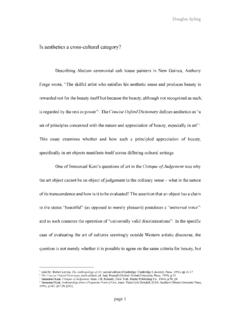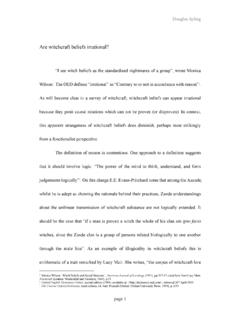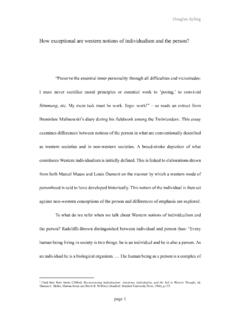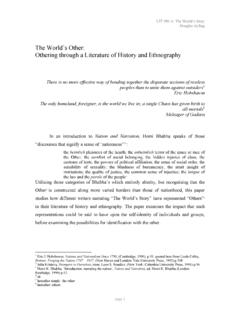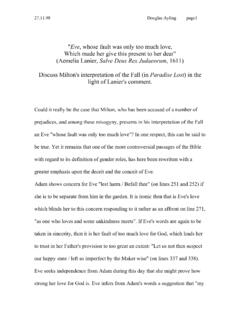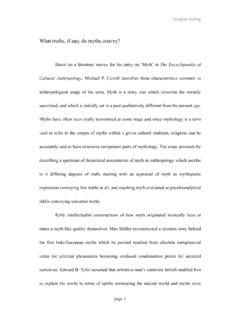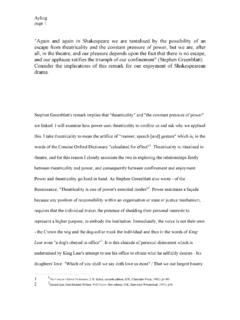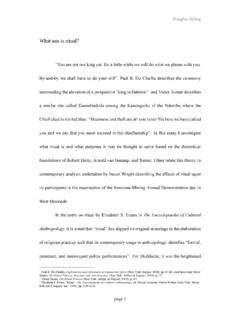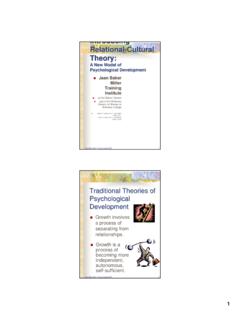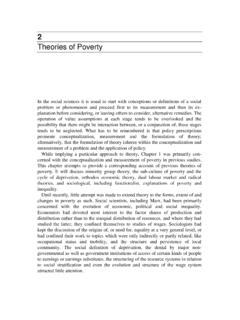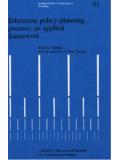Transcription of Why has kinship been so important in the …
1 Douglas Ayling page 1 Why has kinship been so important in the development of anthropological theory ? The OED defines kinship in its anthropological sense as meaning, The recognized ties of relationship, by descent, marriage, or ritual, that form the basis of social organization 1. In the development of anthropological theory , differing aspects of this definition have come to be emphasised. This essay asks what kinship is, why it is central to the societies studied and how ideas about kinship have shaped the development of anthropological theory . Lewis Henry Morgan can be said broadly to have established kinship as a mainstay of anthropological analysis when in his study of the Iroquois and other Native American peoples, he made comparative structural assessments based on what he called the classificatory system of relationship.
2 kinship has since featured prominently in the work of Malinowski, Rivers, Firth, Radcliffe-Brown, Fortes, Evans-Pritchard, Goody, Leach, L vi-Strauss, Dumont, Needham and Strathern; and in the US, Kroeber, Lowie, Murdoch, Goodenough, Scheffler and kinship can be thought of as consisting of: a.) the vertical relationships 1 , retrieved 11th November 2004 2 Robert Parkin, kinship : An Introduction to Basic Concepts, 1997, , Douglas Ayling page 2 between generations descent; b.) the links between brothers and sisters siblingship; and c.) links by and through marriage affinity. Radcliffe-Brown, Fortes and Goody (and in the US, Scheffler) excluded marriage from kinship , making kinship a system of consanguinity. This exclusion shall not hold for the purposes of this essay since the French emphasis on alliance theory over descent theory came to determine the way that kinship is used in anthropology today.
3 Whilst it is by no means true that primitive society remains the sole preserve of anthropology today, the traditional locus of the ethnography that has informed anthropology has ensured that kinship -based analyses attain a high degree of explanatory efficacy in the discipline. As Robin Fox observes, kinship is to anthropology what logic is to philosophy or the nude is to art; it is the basic discipline of the subject 3. Why should this be? Societies in which there is less complex specialisation, less interdependence and stratification and moreover societies which are smaller than those conceived of within the umbrella of the late capitalist nation-state such societies tend to depend more heavily upon kinship statuses to allocate roles to their members. In contrast to an age of bureaucratic rationality or a contract-based modernity, the societies which anthropology has traditionally studied have as Sir Henry Maine noted in 1861 kinship as their 3 Robin Fox, kinship and Marriage, 1967, Douglas Ayling page 3 administrative mechanism.
4 Fox characterises kinship structures as the wide variety of possible social solutions to the facts of birth, copulation and death. In his idiom birth and parenthood provide heirs to counter death whilst copulation provides the relation between mates which is the foundation of marriage and parenthood. Fox wryly suggests that quite aside from the timeless significance of this eternal round of social self-perpetuation which seemed to depress the poet but which excites, amongst others, the anthropologist 4, perhaps another reason for the enduring fascination of kinship rests in a post-enlightenment nostalgia, These unthinking, familistic, kinship -centred loyalties run in opposition to the laws of church and state and the demands of an expanding industrial society 5. A century prior to the alliance / descent debates of the 1950s and 60s, kinship in the work of Morgan, McLennan and Bachofen was playing a part in the evolutionist debate in which it was hypothesised that societal development took the form of a progression from a state of primitive promiscuity, via matriarchal or matrilineal social organisation, to patrilineal descent.
5 John McLennan posited that as hunter-gatherers or itinerant populations assumed a sedentary lifestyle, men would be engaged in working on 4 ibidem, 5 ibid., Douglas Ayling page 4 the land and property would become a significant consideration thereby catalysing a shift to patrilineal descent. Maine disputed these assertions based on his study of Roman law, claiming instead that society had always been patrilineal and patriarchal as evidenced for example by the principle of patria potestas. The assumption that kinship systems could act as fossil records of an ancient time underlies the above claims and is made explicit by Morgan s reasoning that since systems of consanguinity are conservative aspects of culture, they will reflect earlier socio-cultural forms without significant transformation.
6 This understanding of the relationship between kinship and ancient forms is echoed by Pitt Rivers, albeit in his case without recognising a period of primitive promiscuity: I hope that I have shown that .. it is possible to infer with certainty the ancient existence of forms of marriage from the survival of their results in the terminology of relationship 6 he wrote in 1914. Alfred Kroeber had only five years previously emphatically cautioned that Terms of relationship reflect psychology, not sociology , but this arguement was not widely acknowledged7. The question was one of how to separate conceptually the pragmatic formation of alliances or marriages which dictate power and wealth distribution, from 6 Alan Barnard, Anthony Good, Research practices in the study of kinship , 1984, 7 ib.
7 Douglas Ayling page 5 classifications, prohibitions and stipulations as to appropriate kinship allegiance groupings. Arthur Hocart would conclude of moiety organisation in 1933 that The system then is not based on marriage, but marriage is regulated by the system . Radcliffe-Brown rejoined that it is kinship terminology which reflects existing social facts and thereby has normative properties. In Les Structures l mentaires de la Parent , L vi-Strauss added to this the logic of alliance theory by seeing the basis of society not in descent groups but rather in relations of marital exchange which exist between groups. kinship groups then, are merely units of a system of alliances expressed in marriage8. Thus L vi-Strauss s designation of taboo as the essence of culture, and his elision of taboo with marriage proscription suggests that he sees taboo primarily as a code an extension of kinship terminology which governs and directs the movement of women between alliance networks.
8 If as Louis Dumont wrote there is no necessary correspondence between the structure of a society s relationship terminology and the structure of the alliance relationships between its social groupings, how is one to describe a mediation between what is observable as ideology on the one hand and enacted as social behaviour on the other? Rodney Needham s response in Oceania in 1973 was to distinguish between the 8 Fox (1967), ; Barnard and Good (1984), Douglas Ayling page 6 categorical data (consisting primarily of relationship terminology) and the jural level of data or normative precepts and preferences (consisting of a wide variety of cultural guides and legally or morally binding rules and values). At the third and least abstract level of the three, stands data concerning behaviour an individual s actions in context or statistical data in the case of group behaviour.
9 It is within this framework that Needham sought to account for the categorical terminological structures of descent theory being dissonant with the jural precepts and inter-group alliance structures of alliance theory9. Bibliography Barnard, Alan, Anthony Good, Research practices in the study of kinship , 1984 Fox, Robin, kinship and Marriage, 1967 Holy, Ladislav, Anthropological perspectives on kinship , 1996 Parkin, Robert, kinship : An Introduction to Basic Concepts, 1997 9 Barnard and Good (1984).

